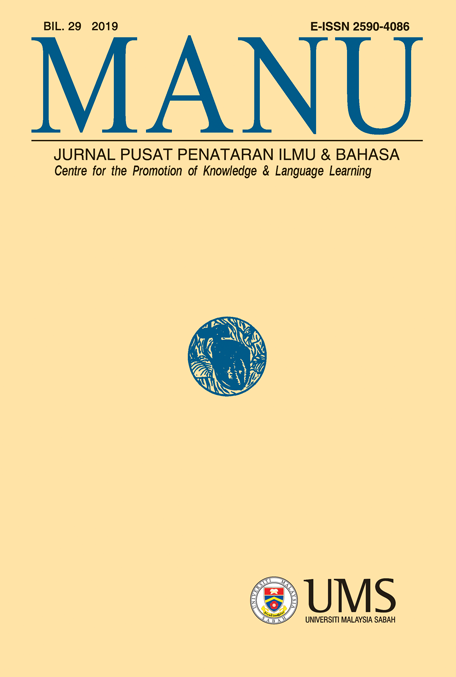UNSUR KEARIFAN TEMPATAN DALAM ADAT KEMATIAN MASYARAKAT BAJAU DI SABAH: ANALISIS DARI PERSPEKTIF HUKUM ISLAM
Local Wisdom Elements on Death Ritual among Bajau Ethnic in Sabah: An Analysis from the Islamic Perspective
DOI:
https://doi.org/10.51200/manu.v29i.1877Keywords:
Kearifan tempatan, Bajau, adat kematian, Sabah, hukum Islam, Local wisdom, death ritual, Islamic perspectiveAbstract
Abstrak
Setiap masyarakat mempunyai kebudayaan tersendiri hasil interaksi dengan pelbagai tamadun dan agama, yang bersinergi dengan berbagai unsur sinkretisme. Hasil daripada campur tangan golongan cerdik pandai tempatan yang mengadunkan antara budaya tradisi dan syariat Islam, telah mencetuskan berbagai corak keilmuan dan kearifan tempatan. Kearifan tempatan dapat dikonsepkan sebagai pengetahuan unik yang didapati dalam sebuah masyarakat yang dikemukakan oleh masyarakat tradisional melalui pengalaman dan integrasi dengan lingkungan persekitaran. Dalam disiplin ilmu Syariah, kearifan tempatan mempunyai signifikan yang tersendiri dalam proses pembinaan hukum Islam. Pengambilkiraan kearifan tempatan ini sangat penting kerana ia mampu mempengaruhi pembinaan hukum Islam berlatarkan realiti masyarakat setempat. Justeru, objektif kajian ini cuba menganalisis kewujudan kearifan tempatan masyarakat Bajau di Sabah khususnya dalam adat kematian mereka menurut perspektif Islam. Hal ini perlu bagi memastikan keseimbangan di antara idealisme yang terkandung dalam hukum adat kematian dalam Islam dengan realiti perlaksanaannya dalam masyarakat Bajau. Sehubungan itu, kajian ini merupakan kajian kualitatif yang menggunakan metode pengumpulan data melalui kaedah temu bual, observasi dan analisis dokumen. Hasil kajian mendapati, dalam adat kematian Bajau di Sabah, terdapat banyak tokok tambah hasil daripada pengalaman dan pengaruh masyarakat setempat Bajau. Unsur tokok tambah ini perlu dianalisis, sama ada ia termasuk dalam ‘urf fasid kerana adanya unsur bid’ah dan khurafat ataupun ia termasuk dalam ‘urf sahih kerana pengambilkiraan kearifan tempatan tersebut tidak menjejaskan proses pembinaan hukum Islam.
Abstract
Every society has forged its very own and unique culture through interactions with various civilizations and religions, which is mostly blended with a wide number of syncretism elements. Later interventions by local Islamic scholars have synergized this cultural tradition with Shariah, resulting in a variety of knowledge patterns, especially with local wisdom. Local wisdom could be conceptualised as unique knowledge found in a local community presented by the traditional society through their experience and integrity with the environment. It is related to the culture in the community which is accumulated and passed on. In Shariah discipline, local wisdom is significant in the process of forming the Islamic law. Consideration of local wisdom in Shariah is very important because it can influence the construction of Islamic law which is the representation of the reality of the local community. Failure to understand the local wisdom of society will lead to a ruling (hukm) that is not relevant and applicable in the community. Therefore, the purpose of this study is to analyse the local wisdom among the Bajau community, especially on their death rituals according to Islamic perspective. This is necessary in order to ensure a balance between idealism in Islamic law and the conduct of the death rituals among the Bajau communities. This is qualitative research which adopts interviews, observation and data analysis. The findings of the study show that there are many exaggerations in the customs of the Bajaus, as a result of the experience and influence of Bajau community. This element of exaggeration should be analysed whether they are classified under ‘urf sahih or ‘urf fasid so as not to affect the process of the construction of Islamic law.
Downloads
Published
How to Cite
Issue
Section
License
All right reserved. No part of this publication can be reproduced without prior written permission of the copyright holder. The written permission of the copyright holder must be obtained before any parts of this publication is stored in a retrieval system of any nature.
Requests for permission to duplicate an article, review or part of this journal should be addressed to the Chief Editor, MANU, Centre for the Promotion of Knowledge and Language Learning, Universiti Malaysia Sabah, Jalan UMS, 88400 Kota Kinabalu, Sabah, Malaysia.









